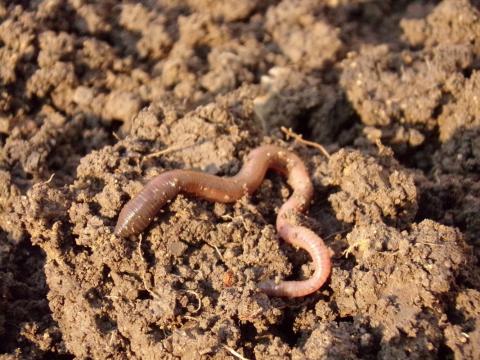Should I put earthworms in my garden?

Earthworms are often touted as having many beneficial effects on soil quality, so it is natural to wonder whether adding earthworms to the garden is a good idea. Studies of earthworms in agricultural settings have found that earthworm burrows can improve water infiltration and soil aeration, and their castings (excrement) form soil aggregates by combining minerals and organic matter. Earthworm activity can also relieve compaction and make nutrients available to plants.
However, it is possible to have healthy soil without earthworms and, if you have good garden soil, earthworms will probably show up on their own. Purchasing worms to add to the soil is not necessary, nor is moving them from one location to another, and such actions can end up causing more harm than good. While earthworms can benefit vegetable beds and compost piles, they can seriously damage natural ecosystems.
It is widely accepted that there are no native earthworms in the northeast. Any species that may have naturally occurred at this latitude were eliminated by the glaciers of the last Ice Age. All of the 16 reported species of earthworms in New Hampshire were unintentionally introduced to North America from Europe and Asia, likely in ship ballasts or on the roots of imported plants. That’s not to say that there aren’t any native earthworm species in North America, but those only exist in the southern half of the United States, and they have mostly been replaced by the larger and more aggressive exotic species.
The forests in New Hampshire adapted without the presence of earthworms. The hallmark of undisturbed forests is deep litter — a thick layer of decomposing leaves and humus. Though worms are seemingly innocuous and don’t tend to harm cultivated garden soils, they can significantly disrupt forest ecosystems by consuming vast quantities of organic matter and altering nutrient and carbon cycles. They can also modify the structure of the soil, speeding up leaching of water and nutrients, and reducing the organic matter layer and replacing it with castings.
Many native plants root primarily in leaf litter and cannot germinate successfully when it is missing. When earthworms are present at high densities, wildflowers like trilliums and trout lilies tend to disappear. As native plant diversity declines, invasive plants readily colonize areas with disturbed soil. Asian jumping worms are especially damaging to natural ecosystems, and they should not be moved.
All that being said, earthworms are established in New Hampshire and they tend to be present in places with good soil. Purchasing earthworms is entirely unnecessary and not recommended.
Earthworm populations are usually highest in places with moist, loamy soil. They often aren’t present in sandy soils because these dry out very quickly and force worms to either go deeper into the soil where they could die, or enter diapause (hibernation) until conditions improve. Sandy soils also have a tendency to be low in organic matter, which leaves worms with nothing to eat. If you want worms to stick around in your garden, adding organic matter in the form of compost or composted manure can help improve soil moisture-holding capacity and provide a food source. Additionally, reducing tillage and mulching can improve earthworm habitat. Finally, properly fertilizing and liming based on soil test results is beneficial, as worms are more likely to inhabit soils that are slightly acidic to neutral.
Online stores often sell redworms (also called red wigglers and compost worms) for composting. In their natural environment these worms would live near the surface and feed exclusively on organic matter. They are most appropriate for use indoor use in vermicomposting set ups. Vermicomposting involves filling plastic or wood containers with and organic bedding and kitchen scraps and adding redworms. The worms decompose the organic material and create nutrient-rich finished compost. Although these worms are not currently thought to survive New Hampshire winters, they have the potential to escape into forests and become an ecological threat, and should not be used in outdoor compost piles.
In conclusion, if you have good soil in your garden earthworms will probably show up on their own, and if they don’t, your plants will likely thrive anyways. Save your money and New Hampshire’s woodlands by not introducing more worms to the landscape.
Related Resource(s)
Do you love learning about stuff like this?
SUBSCRIBE TO Granite State Gardening newsletter
Got questions? The UNH Extension Yard and Garden Infoline offers practical help finding answers for your yard and garden questions.
Call toll free at 1-877-398-4769, Monday to Friday, 9 a.m. to 2 p.m., or fill out webform.
